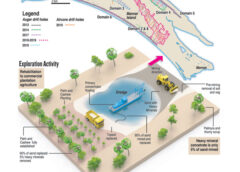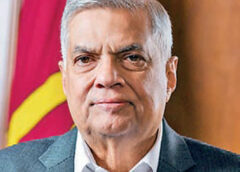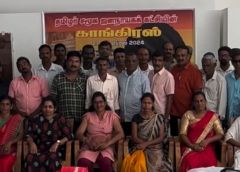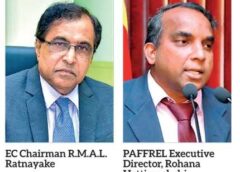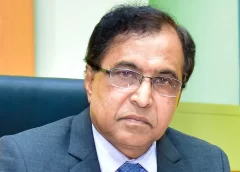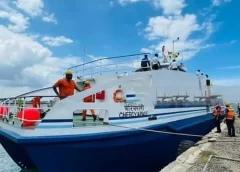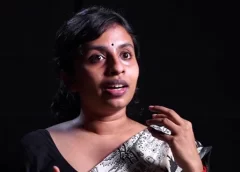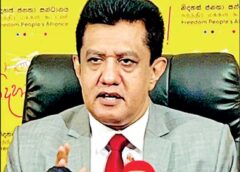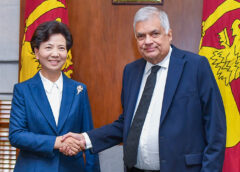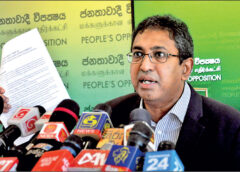Australian company’s multibillion sandmining project mired in Mannar protests Protests hinder progress towards mining licence Residents allege large-scale land robberies involving brokers working for company Environmentalists fear existential threats such as soil losing fertility and contamination of water sources Company representative downplays impacts of the project on people’s livelihood By Mimi Alphonsus and S. Rubatheesan For over a decade, an Australian company has tried to secure mining licences to extract heavy mineral sands from the ecologically rich region of Mannar Island—the fourth largest ilmenite deposit in the world—with little success.…
Read MoreCategory: Featured
Hypocrites as democrats
Hypocrites as democrats Thursday 30th May, 2024 Opposition politicians and some of their government counterparts have taken up the cudgels for the people’s franchise following UNP General Secretary Palitha Range Bandara’s call for postponing the next presidential and parliamentary polls by two years. They say they are ready to do all it takes to prevent the postponement of elections. Bandara’s proposal could be considered a trial balloon floated at the behest of the UNP leadership. However, it is doubtful whether the UNP will dare make an attempt to postpone…
Read MoreGist of the translation of the declarations made in the 2024 Congress of SocialDemocratic Party of Tamils – SDPT- Pathmanabha EPRLF
Will the approaching elections be free and fair?
Will the approaching elections be free and fair? What is the significance of the Election Commission’s (EC) announcement on Thursday that the next presidential election would be held between September 17 and October 16? It is a well-known fact to those who know the relevant Article of the Constitution. It would have only been relevant if the EC had announced the exact date for the election. Goodies and freebies Although President Ranil Wickremesinghe has not declared his candidature for the forthcoming Presidential election, it is clear he has commenced his…
Read MoreEC writes to Prez Secy. on LG polls
EC writes to Prez Secy. on LG polls Says holding polls the answer, not community advisory comms., to oversee LG dev. projects SJB backs same & warns of legal action The Election Commission (EC) has informed President’s Secretary Saman Ekanayake and the other relevant authorities that it is better to hold the Local Government (LG) elections than establishing community advisory committees to oversee development projects under LG bodies. The Government recently announced plans to establish these committees, with the alleged intent of having them oversee development projects within LG bodies.…
Read MoreIndo-SL passenger ferry service to resume mid-May
Indo-SL passenger ferry service to resume mid-May The passenger ferry service between Nagapattinam, India, and Kankesanthurai (KKS) in Sri Lanka, which resumed in October of last year (2023) after almost 40 years, only to be stopped days later, is set to recommence on 13 May. Online ticket sales for the service, which will be handled by a new operator, will go live on 6 May. On 14 October 2023, Prime Minister Narendra Modi virtually flagged off the service between Nagapattinam and KKS. The high speed craft Cheriyapani operated by the…
Read MoreThe ‘due process’ clash of the law
The ‘due process’ clash of the law 03 May 2024 | BY Buddhika Samaraweera Private/unofficial bar lawyers & the Public Security Min. exchange salvos over the ‘Yukthiya’s’ ‘wayward’ ‘mission’ In a landscape fraught with tension, a clash has emerged between the Public Security Minister Tiran Alles and the Bar Association of Sri Lanka (BASL) over the controversial ‘Yukthiya’ (Justice) anti-drug and anti-organised crime operation. The BASL contends that the said operation has veered off course, with due legal procedures often disregarded, while Minister Alles refutes these claims, accusing the BASL…
Read MoreCharitha warns of impending constitutional crisis
Charitha warns of impending constitutional crisis Accuses President of treating Constitutional Council as an agency under his authority Emphasises necessity for an extensive discussion on issue within Sri Lankan society Says action of Govt. could lead to a crisis in governance and it must be stopped Freedom People’s Congress (FPC) member and parliamentarian Prof. Charitha Herath issued a warning yesterday, expressing concern about an impending constitutional crisis in the country. The MP said that in each constitutional amendment since the 17th amendment to the constitution, there has been deliberation on…
Read MoreSri Lanka ready to join BRI phase two, China FTA to be expedited
Sri Lanka ready to join BRI phase two, China FTA to be expedited ECONOMYNEXT – Sri Lanka is among countries ready to join the second phase of China’s Belt & Road Initiative (BRI), with a free trade agreement (FTA) between the two countries to be also expedited, according to a discussion between President Ranil Wickremesinghe and a top Chinese official. Wickremesinghe told visiting special envoy of the Chinese President, state councillor Shen Yiqin, that the BRI is expected to make a more substantial economic contribution, according to a statement from…
Read MoreHarsha exposes flaws in 2024 Budget in hard hitting critique
Harsha exposes flaws in 2024 Budget in hard hitting critique Alleges blatant violation of the Fiscal Management Responsibility Act in Budget 2024, with Budget deficit exceeding 5% Says staggering increase in poverty affecting 3 to 7 million people, highlighting a critical issue overlooked in Budget Critiques Govt.’s “Oxymoron” economic approach and absence of a comprehensive plan for making Sri Lanka an advanced economy by 2048 Says tax burden is excessively high, risking a decline in consumption, business failures, and an exodus of professionals Reveals 18% VAT items list; calls it…
Read More